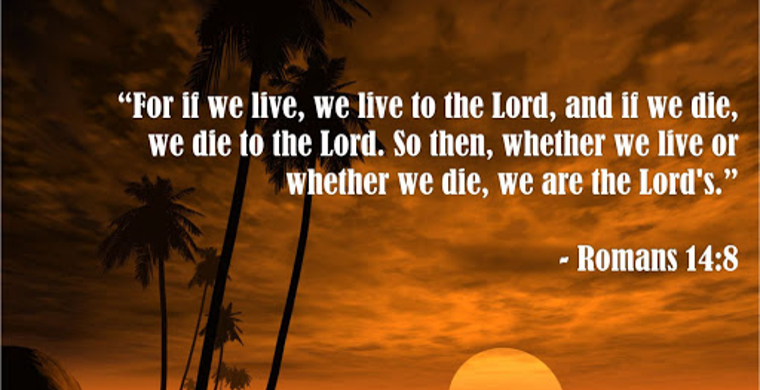COPING WITH DEATH
By Dr Elaine Sugden
www.virtueonline.org
April 3, 2020
It appears that no health service in the world is going to be able to cope adequately with COVID-19.
In the UK most deaths have been among those already frail from old age or chronic illness. A few were young and in apparently good health. They died in hospital, alone apart from medical staff because no visitors are allowed. After death the body is sealed, no one can view the body. No funerals are allowed, just a cremation or burial.
Bravado
In the face of any illness some will say 'I'm going to beat this'. Some think they will not get Coronavirus at all, not show symptoms or fight off the infection easily. We cannot know how it will affect us. Occasionally even young people have died in this outbreak. Everyone is at risk and has to live with uncertainty. Just praying or going to church will not protect us. But remember that those with a Christian faith can be sure that we are in the hands of something more powerful than medicine. Jesus said: "In this world you will have trouble. But take heart! I have overcome the world". John 16:33. In Talking About Dying, (www.talkingaboutdying.org), chapter 11 explores Prayer for Healing.
Addressing fear
Patients are helped by the honesty of truthful information. Many medical staff find it very difficult to tell patients and their families when death is approaching. Chapters 2,4 and 10 talk about the fear which stops us talking about death. Whilst physical pain and other symptoms are addressed by the medical staff, mental pain in the face of dying is more difficult. It can involve anxieties about loss of control of our lives, separation from loved ones -- both for them and for us, frustration at loss of hopes for the future, things left undone, family estrangements and, for many, the unknown of what happens after death. Don't put off questions of faith, do it now.
Act Now
Although the evidence strongly suggests that for the under 40's only those with serious underlying health conditions risk life-threatening disease, nobody's risk of developing this disease in a serious form is zero. So now is the time to talk about dying. How you would want to be treated and what you want to happen after your death? Have you written a will? Have you considered an "advanced decision"? Have you told your family you love them -- sometimes it's important to say the words, not just assume they know.
Contact and saying goodbye
Most in hospital have access to phones and 'screens'. A previously healthy journalist aged 38 wrote: "My difficulty in breathing made it impossible to hold a conversation for more than a minute or two. Were it not for the messages of love and support from friends and colleagues, I would have felt very alone. I felt too unwell to reply but they gave me great strength in the darkness." Sometimes it is necessary to use these facilities to 'say goodbye'.
Quality of death
More elderly people are looking for ways to indicate to their families that they do not wish to go to hospital and overwhelm the health service. They know their chances of surviving a move to intensive care are low. 50% of those in intensive care are not surviving. They would prefer to stay at home, preferably with someone they love. They are asking for home palliative care provision with necessary symptom and infection control for carers. We do not know how this could work but something needs to be done.
Dr Ronald J. Sider has written: "As disciples of the Resurrected One, we labour now, even in the worst of times, knowing that finally our efforts will not be in vain. Those who understand the empty tomb can afford to face danger now. Why? Because we know that in a day, or two, or a million, the Galilean champion of the sick, weak and marginalized will return. In the twinkling of an eye, he will trump Satan's last card. The kingdoms of this world will become the kingdom of our risen Lord.
"The final word is not coronavirus, death, injustice, oppression, or a dead planet. The Almighty One who raised the Lord Jesus will have the last word. That is what can keep us going. We work now knowing that Good Friday is not the last word. As disciples of the Resurrected One, we labour now, even in the worst of times, knowing that finally our efforts will not be in vain."
Dr Elaine Sugden, a retired cancer consultant, and author with others of Talking about Dying
Published with Permission from Barnabas Fund Magazine for April 2020 addressing the Coronavirus














